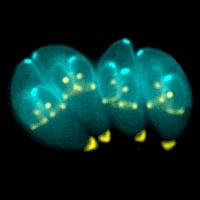 NIMBioS News NIMBioS News
Bi-Monthly News from the National Institute for Mathematical and Biological Synthesis
January/February 2010 - Vol 2, Issue 1
|
|
|
| Report Your Results |
The results produced from NIMBioS research activities are important in measuring our success.
Click the button below for an online form to report publications and/or products that have resulted from your activities at NIMBioS.
|
|
|
Congratulations to New NIMBioS Recipients of Support
|

The sustainability of coral reef ecosystems, the cycling of nutrients in food webs, and the effect of cattle movements on the transmission of bovine tuberculosis are among the topics to be studied in 2010 at the National Institute for Mathematical and Biological Synthesis. The range of topics to be investigated promote the Institute's mission to foster new collaborative efforts to address biological questions using mathematical and computational methods. Newly formed Working Groups and Investigative Workshops for 2010 comprise researchers who will engage in creative and collaborative connections across multiple disciplines. NIMBioS congratulates its new recipients of support, including new Working Groups, Investigative Workshops, short-term visitors and sabbatical scholars. |
March 1 Deadline for New Activities
|

|
|
|
|
Featured Science: A Mad Itch
|
 Feral swine have been described as the most worrisome of non-native
species in the Great Smoky Mountains National Park. These free-roaming
pigs not only root out native plants and destroy natural habitats, but
can also carry disease, such as pseudo-rabies, which is often fatal if
transmitted to other wild and domestic animals. The goal of the NIMBioS Feral Swine/Pseudo-rabies Working Group is to manage outbreaks of disease among feral swine and other wild animals in the Smokies as well as other natural areas.
Feral swine have been described as the most worrisome of non-native
species in the Great Smoky Mountains National Park. These free-roaming
pigs not only root out native plants and destroy natural habitats, but
can also carry disease, such as pseudo-rabies, which is often fatal if
transmitted to other wild and domestic animals. The goal of the NIMBioS Feral Swine/Pseudo-rabies Working Group is to manage outbreaks of disease among feral swine and other wild animals in the Smokies as well as other natural areas. |
Education Focus: REU/REV Summer Program
|
 February 19 is the deadline to apply for NIMBioS' Research Experience for Undergraduates program (REU) and Research Experience for Veterinary Students program (REV) held June 7 - July 30 on the University of Tennessee, Knoxville, campus.
Participants live on campus and work in teams with UTK faculty to conduct research. Disease modeling, population dynamics, biodiversity and climate change
are among this year's research topics. Stipend and housing are provided, along with some funding for travel
support. Click here to read about the experiences of last year's participants. February 19 is the deadline to apply for NIMBioS' Research Experience for Undergraduates program (REU) and Research Experience for Veterinary Students program (REV) held June 7 - July 30 on the University of Tennessee, Knoxville, campus.
Participants live on campus and work in teams with UTK faculty to conduct research. Disease modeling, population dynamics, biodiversity and climate change
are among this year's research topics. Stipend and housing are provided, along with some funding for travel
support. Click here to read about the experiences of last year's participants.
|
Applications Open for Toxoplasma Workshop
|
 Toxoplasma gondii is considered as one of the
most successful parasites for its unusual ability to infect a wide
range of intermediate hosts, including all mammals and birds. Up to 11%
of the human population in the US and 20% in the world are chronically
infected. This workshop aims to explore mathematical tools and problems
in describing the life cycle, stage conversion, and clonal expansion of
T. gondii. Click here for more information and the application. Application Deadline: March 1. Toxoplasma gondii is considered as one of the
most successful parasites for its unusual ability to infect a wide
range of intermediate hosts, including all mammals and birds. Up to 11%
of the human population in the US and 20% in the world are chronically
infected. This workshop aims to explore mathematical tools and problems
in describing the life cycle, stage conversion, and clonal expansion of
T. gondii. Click here for more information and the application. Application Deadline: March 1.
|
Video Feature: An Interview with Gary An
|
 In an interview at the National Institute for Mathematical and
Biological Synthesis, Dr. Gary An, M.D., an associate professor of trauma
and critical care at Northwestern University Feinberg School of
Medicine, explains how mathematical tools can help one investigate how
biological systems behave. Dr. An, whose specialty is trauma surgery, participated in the NIMBioS Investigative Workshop: Optimal Control and Optimization for Individual-based and Agent-based Models. In an interview at the National Institute for Mathematical and
Biological Synthesis, Dr. Gary An, M.D., an associate professor of trauma
and critical care at Northwestern University Feinberg School of
Medicine, explains how mathematical tools can help one investigate how
biological systems behave. Dr. An, whose specialty is trauma surgery, participated in the NIMBioS Investigative Workshop: Optimal Control and Optimization for Individual-based and Agent-based Models.
|
|
The National Institute for Mathematical and Biological Synthesis (NIMBioS) brings together researchers from around the world to collaborate across disciplinary boundaries to investigate solutions to basic and applied problems in the life sciences. NIMBioS is funded by the National Science Foundation in collaboration with the U.S. Department of Homeland Security and the U.S. Department of Agriculture, with additional support from The University of Tennessee, Knoxville.
____________________________________________________
NIMBioS is located on the Univ. of Tennessee, Knoxville, campus
1534 White Avenue, Knoxville, TN 37996-1527
|
|
|
|
|